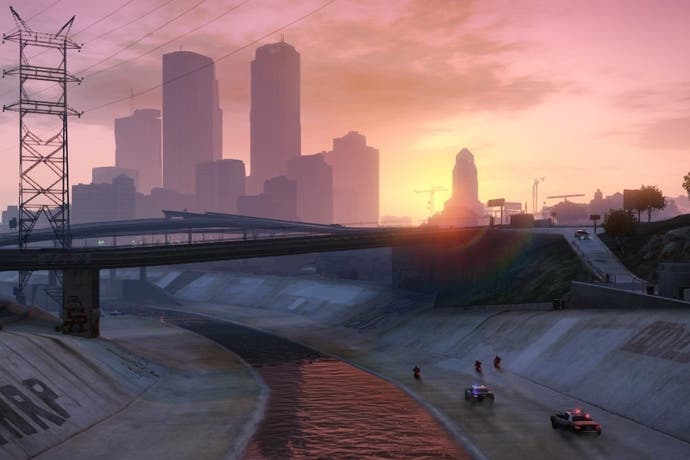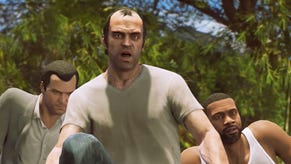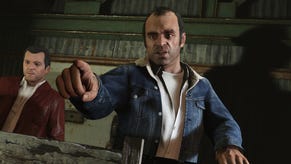Grand Theft Auto 5, one year on
Los Santos mirrors the world as you want to see it, writes Simon Parkin
Wait long enough down by the tracks west of the Palomino Highlands at a spot somewhere on Los Santos' left thigh, and eventually a freight train will clacket along. Some of its carriages are insurmountably tall, but others sit empty and ride low enough that, with a spirited jump, you can haul yourself up for a free trip. You won't have the leathery comfort of a stolen sedan's cabin, or the sky-rollicking freedom of a light aircraft, but there's no better way to see the city.
You'll duck under the roaring flyovers of East Los Santos, race the freeway around the Tataviam Mountains, before wheezing through the Grand Senora Desert, where the air has an arid clarity. As you loop around hick-town Grapeseed you can gaze over Procopio beach to admire the Pacific as it sets sail into the horizon. Time it right and the sky will start its 5pm bruise into dusk just as you circle back into the city, where the traffic twinkles and skyscrapers stretch ambitiously.
You can't talk about Grand Theft Auto 5 without talking about the city. Los Santos exceeds the game in which it's set. It should have been called Los Santos, really. Grand Theft Auto is merely something that passes through the city, one of many stories that you pick up every now and again, in between following your own sojourns and distractions. A year on (or a decade, if you count the city's fuzzier debut in 2004's Grand Theft Auto: San Andreas) and Los Santos remains the best world in a game, an eager tribute to Los Angeles that blends the real and imagined.
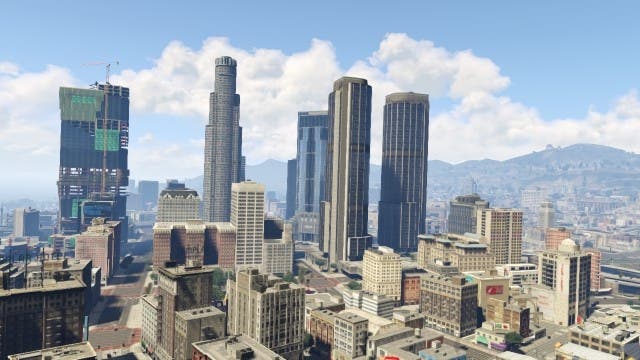
The idea that cities have personalities is true, but only to a point. They might have an aesthetic, a combination of the manmade and the natural, and its inhabitants might have a peculiar temperament (influenced by the dominant weather or the dominant industry) but in truth, we project our own hopes and insecurities onto the cities where we visit or settle. This is true of Los Santos, a city that allows you to take from it what you want. It can be a place of peril and sin as you hold up petrol stations in Davis (the city's gang-torn analogue to Compton). Or it can be a place of peace and leisure as you chase a wild deer through the thin air of a mountain on a bike.
Here, you can be who you need to be. Want to dress in a tailor-made suit and promenade along the Del Perro pier, with its groan and slop, or swim with sharks in Paleto Bay? Sure thing. Want to listen disapprovingly outside a teenager's bedroom door as he watches porn? Why not? You can live the high life using the proceeds of your stock market investments, or become a property tycoon. Or you can slum it with the poor: the Harmony town hicks, with their dust dungarees and moonshine-rosy cheeks, or the shufflers in the projects with their frayed jeans and crack white eyes. Los Santo, like its analogue Los Angeles, is a city of invention and reinvention: give and take what you need.
This is also true of Grand Theft Auto 5 in general: a game of such scope that it allows us to see what you need to see. You can look at Rockstar's opus as a technological miracle, a game that recreates one of our species' great cities in sound and light, a cathedral of pixels. Or you can look at it like a holiday destination, a place to tumble about with friends, racing mountain bikes or planning heists online. Or a sandbox in which to explore your darkest fantasies - cop-killing, hooker beating, drug-running - all within a consequence-less safe place.
You can see the game's missions as spectacular set-pieces, tearing the down the frontage of a penthouse using a tow truck, or trying to reclaim your yacht and missing son from thieves in a highway chase. Or you can see these moments as failures of mimicry, which recreate the spectacle of television greats such as The Sopranos or The Wire, but fail to transpose their substance and meaningful human drama. Rockstar undeniably has a talent for mimicry and exaggeration. When it's applied to nature (the waves, the birds, the sun) or to construction (the traffic, the stores, the subway) their work is utterly unrivalled. When it's applied to the movies and TV shows the results are somewhat plainer and, at times, charmless. At least, if that's what you choose to see.
You can look at the game as knowing satire. At times it successfully skewers western culture's enormities and failings (even if the satire often has a certain Bansky-esque plainness to it: 'Keep calm and carry on sharing', suggests a poster on the wall of the Life Invader offices, Los Santos' version of Facebook). Nevertheless, it's a game that elegantly comments on the perils of capitalism: once you've made your money, all that's left to do is learn how to play tennis, race jet-skis or buy up more property. Your purpose is gone. Or maybe you don't buy the satire, and see only weak jokes that throw punches in all directions, and land only few.
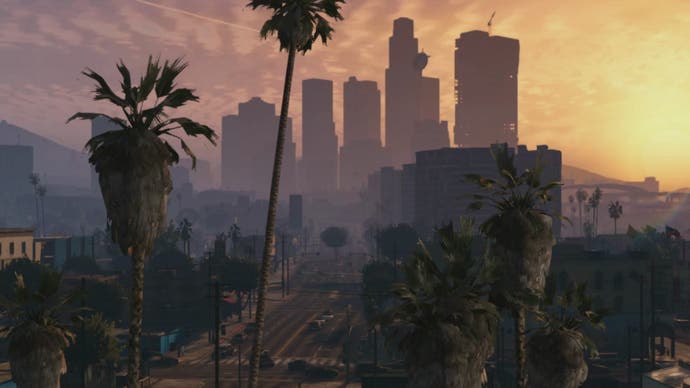
You can see the game as anti- (or at least ambivalent towards) women, who appear exclusively as objects of desire or ridicule or scorn. Then again, have you met the men? Monsters, the lot of them. If the women dismay in GTA 5 by their absence, the men dismay by their presence. Nobody is likeable, here in the city fuelled by ambition, or grown lazy and aimless with success and wealth.
This latter point is less easily overlooked (although the recent re-release, with its first person mode, at least means that you don't have to look at the trio of undesirables all the time). But is their monstrosity and moral repugnancy a problem? To contemporise Henry De Montherlant's phrase that 'happiness writes in white ink on a white page,' so goodness displays transparent on the screen. Trevor, Michael and Franklin are memorable, precisely because of their darkness. And perhaps the fact that their (and by association our) heroism is achieved through violence is a cultural failing, rather than that of the writers. The American idea of heroism is almost always linked to violence.
A year on and Grand Theft Auto 5 still defies straightforward definition or critique because it is simultaneously so many games all at once. Like all cities, as we enter Los Santos we bring with us our own perspectives, hang-ups, ambitions and fears and embrace or reject them accordingly. Los Santos is a mirror to Los Angeles, but also to the individual playing. This kind of projection happens with all art and entertainment, but perhaps more so with video games, the only form in which we take an active participant role. And perhaps more so still in open world games, in which our freedoms are so broad and so accommodated. And, perhaps even more so still of Los Angeles, city of reinvention, through which you can ride a train, and see whatever it is that you need to see.
